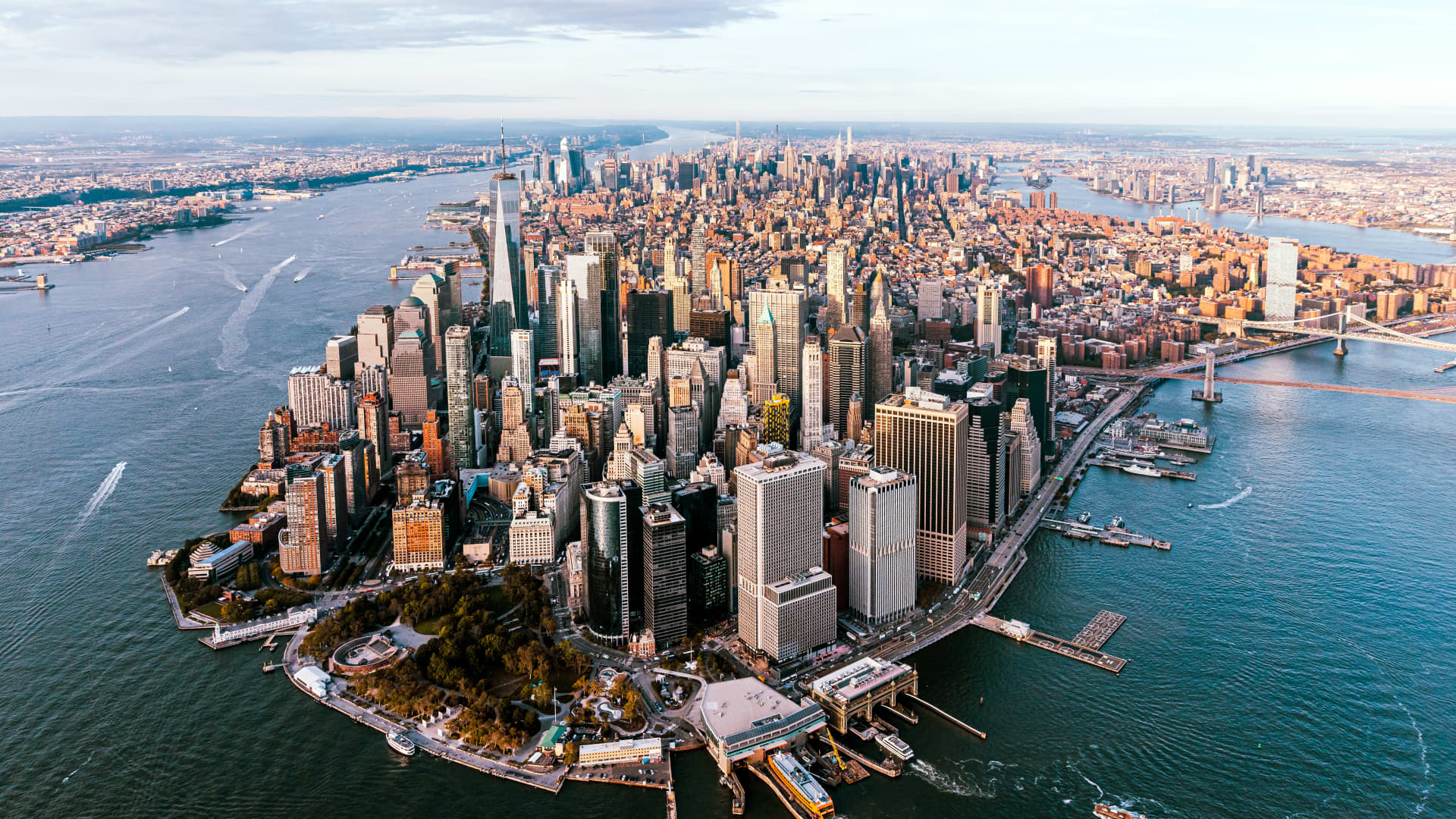Products You May Like
The total private wealth held by New York residents was found to exceed $3 trillion.
Alexander Spatari via Getty Images
New York City is home to the most high-net-worth individuals in the world, according to a new report by investment migration consultancy Henley & Partners.
Around 345,600 millionaires reside in the Big Apple, alongside 15,470 multi-millionaires who have assets worth over $10 million, 737 centi-millionaires (wealth of $100 million or more) and 59 billionaires, the report said. The financial center of the U.S. is recognized as the wealthiest city in the world by several measures.
The report finds that around 4% of New York’s 8.38 million citizens own investable assets – property, cash or stocks – worth over $1 million. The number drops significantly to 15,470 when assessing those who have more than $10 million in assets.
The total private wealth held by New York residents was found to exceed $3 trillion. Remarkably, that’s more than the total private wealth held in most major G-20 countries.
Japan’s capital Tokyo ranked second with 304,900 high-net-worth individuals. Compared to New York, a much smaller proportion of them have assets worth over $10 million. The report found that 7,350 people in Tokyo are multi-millionaires, 263 have above $100 million and 12 are billionaires.
The San Francisco Bay Area – which includes Silicon Valley – rounds out the top three wealthiest cities, with 276,400 high-net-worth individuals, 12,890 of whom are multi-millionaires. The report said 623 have assets worth at least $100 million and 62 billionaires live in the city.
Los Angeles, Chicago and Houston are the other U.S. cities in the top 10, ranking 6th, 7th, and 8th, respectively.
Cities with the fastest growing millionaire populations
Houston also has one of the fastest growing millionaire populations – high-net-worth individuals that have increased by 6% so far this year, according to the report. Austin, Miami, West Palm Beach and Greenwich are other U.S. cities that have seen a major year-to-date increase in high-net-worth individuals.
The report links this to major American companies moving their headquarters to these cities. Since the onset of the coronavirus pandemic and the shift to flexible working, companies require less office space and many employees moved to smaller cities to improve their quality of life and lower their cost of living.
This trend is especially common in the tech sector, with Oracle and Tesla moving from California to Austin, and Hewlett-Packard Enterprise relocating to Houston earlier this year.
Additionally, these cities have become prime retirement destinations, Andrew Amoils, head of research at wealth intelligence firm New World Wealth, who collaborated on the report with Henley & Partners, told CNBC.
“Florida is an increasingly popular destination for retired high-net-worth individuals, especially those from the USA’s East Coast cities,” he said.
The top five cities with the fastest growing millionaire populations are not in the U.S., however.
Riyadh in Saudi Arabia, Sharjah and Dubai in the United Arab Emirates, Lusaka in Zambia, and Luanda in Angola are in the lead. In the first half of 2022, they saw an increase of up to 20% in terms of their high-net-worth population.
The report links this to booming oil and gas industries, which have flourished as energy prices have soared and boosted stock markets in these areas.
Many major cities saw a decline in millionaires
The high-net-worth population is not exploding everywhere – many major cities fell in the ranking or saw a significant reduction of ultra-wealthy people living there.
Out of the top 10 cities with the largest number of high-net-worth individuals, seven saw a decline. Only the San Francisco Bay Area, Singapore and Houston saw growth.
New York, for example, has already seen a 12% drop in high-net-worth individuals in 2022, while Los Angeles saw a 6% decline and Chicago’s proportion of ultra-wealthy citizens fell by 4%.
Typically, high-net-worth individuals within the U.S. “are related to finding better business opportunities in another city/state. Also, safety concerns and taxation are major drivers,” Amoils said.
Another factor to consider is that overall wealth has declined in 2022, Amoils said in a paper released alongside the report.
“Worldwide high-net-worth individual numbers were down by 5% in the six-month period to June 2022. This drop was mainly due to the poor performance of major stock market indices,” he said.
This means that the drops in high-net-worth populations are not solely related to people moving to different cities – there are also simply fewer people who fall into this category.
Various major cities in Europe and Asia also saw drops in high-net-worth populations. The U.K.’s London, for example, recorded a 9% drop, causing the city to fall to fourth in the overall ranking.
France’s capital Paris fell by three places to 20th, meanwhile, as the city lost 12% of its high-net-worth individuals.
The top 10
These are the 10 wealthiest cities in the world – and how many high-net-worth individuals live in each of them – according to Henley & Partners’ report.
1. New York, U.S. (345,600)
2. Tokyo, Japan (304,900)
3. San Francisco Bay Area, U.S. (276,400)
4. London, United Kingdom (272,400)
5. Singapore, Singapore (249,800)
6. Los Angeles, U.S. (192,400)
7. Chicago, U.S. (160,100)
8. Houston, U.S. (132,600)
9. Beijing, China (131,500)
10. Shanghai, China (130,100)
Correction: This article has been updated to correct the number of millionaires who live in New York City.
